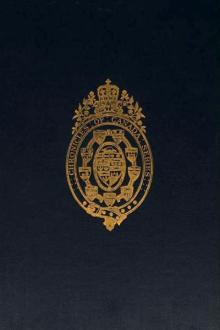The Philippine Islands, 1493-1898 - - (books successful people read txt) 📗

- Author: -
- Performer: -
Book online «The Philippine Islands, 1493-1898 - - (books successful people read txt) 📗». Author -
Documents of 1579-82
Decree regulating the foundation of monasteries. Felipe II;
Aranjuez, May 13, 1579.
Letter to Felipe II. Francisco de Sande; May 30, 1579.
Expeditions to Borneo, Jolo, and Mindanao. Francisco de Sande,
and others; April 19, 1578 to June 10, 1579.
Appointments to vacancies in Manila cathedral. Felipe II;
[promulgated from?] Guadalupe, March 26, 1580.
Letter to Felipe II. Gonçillo Ronquillo de Peñalosa; July 17,
1581.
Ordinance restricting departure from the islands. Gonçalo
Ronquillo de Peñalosa; March 2, 1582.
Letter to Felipe II. Gonzalo Ronquillo de Peñalosa; June 15,
1582.
Sources: These documents are obtained from MSS. in the Archivo de Indias, Sevilla, except the royal decrees; these are taken from the original MS. documents in the "Cedulario Indico" of the Archivo Historico Nacional, Madrid.
Translations: The first and fourth documents are translated by Alfonso de Salvio; the second and third, by James A. Robertson; the last three, by José M. Asensio.
Royal Decree Regulating the Foundation of Monasteries
The King.
To our governor of the Filipinas islands:
Fray Domingo de Salazar, of the Dominican order, and bishop of the said islands, has reported to us that he is going to reside in these islands; and that he will take with him religious of his order to found monasteries, and to take charge of the conversion and instruction of the natives. He has petitioned us to issue commands that whatever is done for the above order, as for those of St. Francis and St. Augustine, be done at our expense and that of the Spaniards and Indians (as has been done in other parts of our Indias), or as suits our pleasure, and as it receives the approval of our Council of the Indies.
Inasmuch as we have provided that monasteries be founded in Nueva España wherever it is necessary, and have ordered that, if the chosen places be villages belonging to the royal crown, the monasteries are to be founded at our expense—the Indians of such villages contributing their labor in the work and erection of the buildings; and that, when the villages are in charge of encomenderos, the monasteries are to be founded at our expense and that of the encomenderos, as well as with the help of the Indians of such villages apportioned as encomiendas: therefore it is our desire that the same orders be carried out in the founding of monasteries in those islands. I order you immediately to ascertain in what districts and places of those islands monasteries are needed; after which you will take the necessary measures toward their erection, being careful that the houses be modest, and that they be not superfluously furnished. If the villages where they are to be founded belong to our royal crown, you will give orders that they be erected at our expense, and that the Indians of such villages contribute their labor towards the work and building of them. And if the villages are in the charge of private persons, the monasteries are to be built at our expense and that of the encomenderos; with the aid of the Indians of such villages apportioned as encomiendas, as above mentioned. If in the villages live Spaniards holding no encomiendas of Indians, you will assess them also according to their condition and property, for they are in like manner under obligation to contribute toward the building of churches. The sum paid by the said Spaniards will be subtracted from the share demanded from the said Indians and encomenderos; for since this is a good work, beneficial to all, it is only right that all help toward its completion. Being thus a matter of such importance, you will devote to it all the care that it requires, remembering that no new monastery of a different order is to be founded in the same village or its vicinity.
You will be careful always to inform us of what is being done in this respect, and of the result of the labors of the religious.
I, The King
By order of his Majesty:
Antonio de Heraso
Aranjuez, May 13, 1579.
Letter from Francisco de Sande to Felipe II
Royal Catholic Majesty:
Last year, seventy-eight, in July, I wrote to your Majesty and advised you of my expedition to the island of Borney, and its outcome. This year I sent thither a fleet, which brought news that the city had been rebuilt. The Moro king there detained the captain until he had placed his clothing and wives in safety. The captain, in accordance with his instructions, returned without doing them any damage. I am quite sure that that king will quietly submit, if we effect a settlement there.
The king of Jolo rendered obedience to your Majesty and surrendered his artillery. This year he gave as tribute a piece weighing fourteen quintals that must have been hidden away.
This year of seventy-nine, I sent an expedition to pacify the river of Mindanao. The king ruling there fled; but, as our people carried orders not to do any harm there also, peace was made, and some of the natives returned. If we plant a colony there, that king also will submit—which cannot be effected in any other way, because of our distance from there.
In August of seventy-eight a galleon and a large galley with five hundred men, and other necessary supplies for Maluco, passed Borney. It is said that one hundred were Portuguese and Spaniards, and the rest mestizos [19] and people from Yndia. According to a Cafre [heathen], their hulks were in very poor condition. He says they were going to Maluco to collect the tribute which was lost three years ago. I am sending the investigations and accounts of this and of everything to your Majesty's royal Council, and am writing more in detail. I beg your Majesty to be so good as to favor this other world by examining this letter. Because of your Majesty's stringent orders not to go to Maluco, we have not gone thither. However, the compact, as I have advised your Majesty is not well considered; and Maluco is not comprehended in it, and is in your Majesty's demarcation. [20] Thirty vessels leaving and returning to Sevilla could load cargoes of spices—pepper, camphor, and other drugs and spices. In these vessels, people could be brought from España, and a few fleets would populate this land, and clearly we could take possession of all of China; for by way of Nueva España the despatch of vessels will always be a trifling matter, and by way of the strait of Magallanes I do not believe that we can hope for so good a result. I am writing in detail regarding this to your Majesty's royal Council. I am writing also of the method which I think we should employ—namely, to settle in greater Java, whence we should despatch a vessel to Sevilla to give information of the route, although I believe that that made by the ship "Victoria" is not forgotten.
I have built a vessel here of six hundred toneladas, which can make the said voyage, if your Majesty will so order; and I am now building another. There is an excellent fleet of galleys; and with what was captured from the Borneans, and in Jolo and Vindanao, and with that taken from the Portuguese galley which I said was lost, we have more than two hundred pieces of artillery. From the useless pieces I am casting others. Certain Indians in this land have founded for me one piece weighing ninety quintals; and there is not in the castle of Milan a piece so well made. Another mold has been made, and the Indian says that he will make as many as are ordered. From Nueva España no favorable message, in regard to this or other things, is sent. Therefore if your Majesty wishes that China be yours in your days-please God, may they be many, as we your Majesty's servants need—it is necessary for the execution thereof that ships be sent here from Nueva España, since now we have some knowledge of this region, and the vessels have here a good port, and we know how to proceed.
This archipelago is secure from enemies, blessed be God. We have begun settlements—one in the province called Cagayan, in the northern part of this island, and sixty leagues from China.
In other letters I have begged your Majesty to be so kind as to favor me. Once more I bring this to your memory. I beg your Majesty to grant me a habit and an encomienda for myself, and another for one of my brothers. All of my brothers are serving your Majesty in the war, and I am sure that they deserve the most that I beg and entreat. I am writing to the royal council. I beg your Majesty to order that my case be examined, and to honor this office in which I serve you, and bestow favor upon one who has served you for so many years as I. May our Lord preserve your Majesty's Catholic and royal person, and increase you for many years as we, your servants and vassals, desire. Manila, in the island of Luçon, in Philipinas, May 30, 1579. Royal Catholic Majesty, your Majesty's loyal vassal and servant, who kisses your royal hands,
Doctor Francisco de Sande
[Endorsed: "Doctor Francisco de Sande. June four, 1581. He requests a habit and an encomienda. To the Council of the Indies." "Seen, and no answer is required."]
Expeditions to Borneo, Jolo, and Mindanao
In the galley named "Santiago," on the nineteenth of the month of April, one thousand five hundred and seventy-eight, the very illustrious Doctor Francisco de Sande, governor and captain-general for his Majesty of the Western Islands declared: that, inasmuch as his Lordship is going with a fleet of galleys to the island of Borney, both to teach the natives there the Christian law, and to reduce them to the dominion of his Majesty—as well as to ascertain and inform himself about the customs, past and present, of the said natives, what law and ceremonies they observe, and the mode of life among the natives thereabout and in other parts, who are vassals of his Majesty—in order to attain this he ordered to be conducted, and did conduct, the following inquiries and procedures:
For the investigation of the above-named matters, the aforesaid governor summoned to his presence an Indian who, through the medium and speech of Juan Ochoa Ttabudo, an interpreter, declared his name to be Magad-china, and himself an inhabitant of Balayan. Without taking the oath, he promised to tell the truth; and, being interrogated according to the tenor of this declaration, said that he knows that the king of Borney is wont to detain many Indians who resort to Borney for trade and intercourse, and that he does not permit them to leave the country, especially those Indians whom he knows to be rich. The witness knows that the king forces them to marry in that country, so that at their death he may obtain their possessions. In this way he has seen detained against their will, Indians of Çubu, the island of Lucon, Balayan, Bonbon, and other districts of these islands—all rich and influential men. In especial was he acquainted with an Indian of Manila, a messenger of Raxa Soliman, by name Simalinquidlan; another named Siparan, a native of Manila; and a chief named Siganbal, a native of Balayan, whom he (the present witness) knows to have been detained by the king of Borney, in his country, and he does not allow them to leave it. The said chief of Balayan has been detained six years, and some eighty or ninety tacs of gold were taken from him, besides





Comments (0)